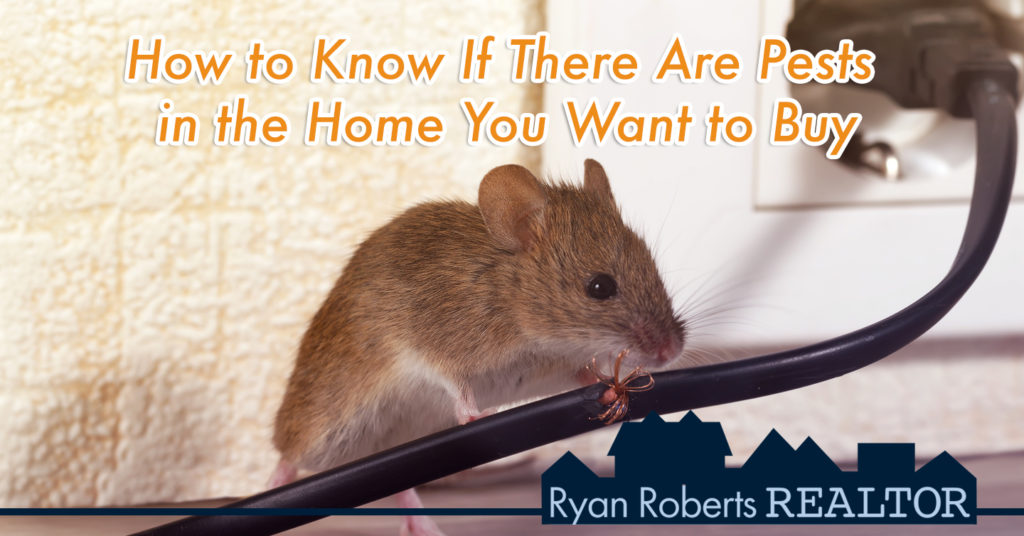
The cosmetics and functionality of a house are huge aspects to consider when house shopping; however, one issue can go unnoticed by potential buyers: pests. It may be an issue that is even unbeknownst to the current homeowner. Hidden pests in the home you want to buy should be a considerable concern because it may lead to unexpected maintenance costs—and the discomfort of creepy crawlies.
To avoid these unwanted factors, follow these tips when you go to an open house or a tour.
Rodents
Rodents, such as mice and rats, can spread diseases, ticks, and fleas. They leave droppings everywhere and tend to chew through boxes and fabric. To check if a house has a potential rodent problem, look for these signs:
- Scratching sounds behind walls—but be aware that rodents are nocturnal;
- Small holes in flooring or baseboards;
- Small animal droppings;
- Dirt or grease trails;
- Strange smells
- Signs of nesting inside cabinets or behind furniture; and
- Furniture, built-ins, wiring, etc. that appear chewed through.
Bugs and insects
When you need to figure out if there are pests in the home you want to buy, bugs and insects are significant culprits. Spying cockroaches, ants, silverfish, and any other insect or bug scurrying across floors or counters can showcase a potentially deeper problem, even if a swarm isn’t apparent. Consider these signs for a bug and insect infestation:
- The creatures themselves, dead or alive;
- Bug or insect parts, like limbs;
- Strange smells;
- Bee, wasp, or hornet nests, abandoned or active;
- Moisture-damaged walls or wood, which could indicate carpenter ants; and
- Signs of chewing in cardboard, paper, or fabrics.
Other important insects to consider with their own common signs are termites and bed bugs. You’ll know to suspect a possible bed bug or termite infestation if you see these signs:
For termites
- Mud tubes outside the house or in the basement and crawl spaces;
- Walls that shouldn’t feel hollow;
- Weakened, sagging wood or wood with honeycomb patterns;
- Similar damage in surrounding trees; and
- Damage to exterior structures, like patios and decks, fences, sheds, etc.
For bed bugs
- Rust-colored stains on mattresses and furniture fabric;
- Miniscule, creamy eggs in furniture nooks; and
- Dot-sized black spots, or bed bug feces.
Note: If you suspect you toured a home with bed bugs, rigorously clean, check, re-check, and re-clean any clothes or bags you wore while in the house. These insects are notoriously difficult to eliminate and can easily spread from one home to another.
Other signs to notice
Sometimes, pests in the home you want to buy are not immediately obvious through activity alone. These other signs don’t immediately imply a current infestation, but may suggest an imminent one—one you’ll have to deal with sometime after purchasing the home. As you tour the house, look out for openings or crevices in the home that lead outside, including pipes, unscreened vents, and cracks between doors and windows.
Additionally, bad plumbing—which can lead to moisture-rich walls and floors—can cause termite and carpenter ant infestations. Badly stored firewood or mulch laid too close to buildings can also invite termites, ants, and other pests. Clogged, soggy gutters may promote mosquito activity, and damaged and chewed roof tiles may indicate wildlife issues.
Don’t forget to consider the lot itself and the surrounding neighborhood. Heavily wooded lots, or lots with overgrown gardens and other foliage, may help create unwanted wildlife habitats.
What to do if you suspect your desired home has a pest problem
Pest-related issues are usually simple to fix through prevention techniques or professional pest control assistance. Besides, pest control is a natural part of home ownership. However, that doesn’t mean pest problems can never be a deal breaker.
Consider asking the seller about previous (or current) pest infestations, though note that Alabama adheres to the caveat emptor rule—i.e., sellers are not legally required to disclose physical problems with the home unless said problems pose a health risk. Regardless, you should also get a home inspector to check for flaws in the house, including pests in the home you want to buy. Pest problems aren’t always easy to spot, and the seller may be unaware of an issue.
Use these tips to help get an idea about maintenance you’ll need to undergo before or after purchasing the home. Otherwise, these tips can help you identify a deal breaker.
For more home buying tips and advice, continue following the Ryan Roberts blog! Looking to buy a home in the Auburn, Lake Martin, or Opelika area? Call Ryan Roberts at 334-750-9872 or email c.ryan.roberts@gmail.com!

